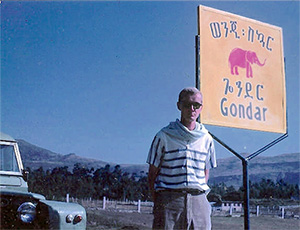“Remembering Zewale Zegeye” by Richard Lyman (Ethiopia)
Remembering Zewale Zegeye
by Richard Lyman (Ethiopia 1962-64)
It was better than any college or high school reunion to see old friends and colleagues with whom 49 years ago I shared an adventure and life-changing experience.
On September 13th, The Embassy of Ethiopia, in honor of the fiftieth year anniversary of the founding of the Peace Corps, hosted a reception and delicious Ethiopian buffet for Peace Corps volunteers who served in Ethiopia from 1962 through the start of the turmoil in the ’70s. It was my honor to be a member of “Ethiopia I,” among the first 280+ Peace Corps teachers invited to Ethiopia by Emperor Haile Selassie in 1962. At the time the secondary schools of Ethiopia were a bottleneck through which too few students were able to graduate and pass on for additional training and/or attendance at the University.

Gondar in 1963
Twelve of us were assigned to Haile Selassie Secondary School in Gondar. It was the only secondary school in the large historic province of Begemeder in N W Ethiopia.
Students came from hundreds of miles from remote villages and farms to attend the school. If they had no family in Gondar they lived in improvised shelters and subsisted on an extremely modest government stipend. It was many a night that we would see students doing their homework while seated under the faint glow of the few streetlights in the town.
Five years ago my son, John, the editor of this Journal,* persuaded me that it was time to revisit Ethiopia. At the time, John was studying in Paris so I “picked him up” and off we went to Ethiopia. In the back of my mind was a wish to reconnect with former students and to be able to write about their lives then and now and how they survived famine and the chaotic revolutionary decade of the ’70s. For the “then” part I have my detailed six volumes of diaries I kept while teaching. From my mother, I inherited a tendency to save everything so I even brought home a vast archive of student essays and papers.
Gondar is no longer a sleepy provincial capital. It now has a population of over 100,000 plus a university and even a modern beer plant. My expectation of reconnecting with former students was not met. John and I did, however, make wonderful new friends. My old school is still a big part of the community, however, now it is named Facilidas School after the ancient emperor whose palaces and public works abound in Gondar.

Richard’s Peace Corps home that he shared with several other PCVs
The house where I lived surrounded by a five-acre field is now almost hidden by numerous houses. The house itself has been added onto and is now a school for over five hundred Montessori students. John and I had a tour of each of the thirteen classrooms wherein each one the students performed a song or recitation in our honor.In one classroom we listened to an anti-corruption song.
One of the many former students I hoped to see again was Zewale Zegeye with whom I had corresponded with into the 1970s. At that time, I quit writing to him for his own safety as I thought with the revolutionary chaos in the country the last thing he needed was to be accused of receiving letters from America. Zewale was a natural leader. He was the leader of the Scouting troop in Gondar started by Mr. Ward, the former British headmaster of our school, and he was student body president in his senior year.
Zewale loved to write plays, which we might view as being in a “Bollywood” genre. In my diary notation for May 18, 1963, I wrote of Zewale coming to my house late in the day because for the twelfth time he had to go to the local Ethiopian Government Ministry of Interior office where the officials had deleted lines from a play he wrote and planned to direct. He was extremely upset and asked me “In America do you have to have your plays approved?” I replied “no” and then asked him a question whether in his lifetime he could remember when there could be no plays at all. He admitted that he could. We discussed the fact that small progress might give him hope for greater freedom in the future. I was reminded of my favorite Ethiopian proverb “Cus b cus inculal begaru ye hidal” (Little by little an egg gets legs and slowly walks away.” Zewale went on after high school to work in the office of the City Council in Addis.
This is an excerpt from the last letter I received from him in August 1970:
. . .
Last year I ran for the parliamentary election to represent the town of Gondar, but I failed. The purpose of my competing was to awaken the people by telling them what I know and what should be done. I gave lectures for over ten times at the Haile Selassie 1st. Square in the Piazza of Gondar, under the big oak tree south of the Facilidas Castle on the way to the arada (market) if you remember it. I saw thousands of clapping hands during my lectures, but unfortunately, those who were registered and who had most of the cards were those who know nothing about the lecture and those who did not know what a parliament can do. Even most of the candidates were the same as them.
What I have seen is money electing people not people electing people. Anyway, nothing can be finished unless it is started, so I will try again and again hoping to be a member one day, even though there are many obstacles which I should walk over.
I wish happiness, good health and good fortune to you and yours.
Sincerely yours,
Zewale Zegeye
I learned while revisiting Gondar that sometime after that letter was written Zewale served as an administrator of a district north of Gondar near Dabat. While there he came to the attention of the military strongman in Gondar who assassinated Zewale by dragging him to his death behind a vehicle.
•

Richard as a PCV
Richard Lyman (Ethiopia1962–64) is from Excelsior, Minnesota and attended Carleton College where he received a B.S. in agricultural economics in 1961. At the university, he was a member of the honorary fraternities and chairman of the Student Center Board of Governors. Active in 4-H club work, he won several state awards in this field and was a member of a number of National 4-H Congresses. The father of three boys, he was a farmer for a number of years and then started a successful environmental Firestarter company.
•
*This article was first published on International Policy Digest.
I enjoyed this piece. Thank you.
The profound elegance we experienced in Ethiopia and the many deep, thoughtful and competent people we were involved with, opened us to lives we could, otherwise, never have known. I am overwhelmingly appreciative, every day, for my time in The Horn of Africa.
My respect and appreciation continues. Probably, because of the place I live, I am frequently involved with Eritreans and Ethiopians and reminded of their pervasive contribution to my life.
Thanks for the memories about Gondar. I was based in Addis at Haile Selassie First Secondary on the edge of town….a boys only boarding school. Five Ethiopia 1s moved into our home just outside the grounds of the school. I returned to see the school at our fantastic reunion in 2012 along with my adult daughter. The semi rural area was unrecognizable to me except for the wrought iron gates guarding the school. While standing on the grand front steps up o the main building I could hear students in my head and all the multicultural faculty making announcements each morning.
On the day of President Kennedy’s assassination school was cancelled. The students came in small groups to silently stand in respect of the President and to pay their respects to all of us. A solumn moment. Many days later we finally all saw an ASID film of the events in Dallas and the long slow walk along Pennsylvania Ave on the day of remembrance and funeral services. Many years later I returned to DC for a reunion and joined the procession from Arlington Bridge past the eternal flame at the Kennedy grave site and on to the place where a program was presented. Each reunion since passes along he same path. It usually brought tears to many an eye in our group as we had heard President Kennedy address us in the Rose Garden at the end of our training in the summer of 62″. We were among the first large contingent to journey across the world as proud Americans citizens. It was indeed an honor we can only now appreciate to the fullest!
Thank you, Richard. I knew Gondar and your house there when I worked with Ethi II’s, III’s, and IV’s in the two years after you left. Gondar was a special place, and somehow the PCVs there were always among the best in their groups. Your writing brought back happy memories of a very special time and place.
Many Thanks Mr Richard.
In 1964 I was a 7th grade student at the Secondary School you mentioned.
I knew Zewale who was president of the Student’s Council.
I also know of what happened to him as described by you.
I have fond memories of those times.
I was 15 years old at that time; now 73 – unbelievable.
My American teachers included Mr. Sutherland, Miss Green, Miss Markham.
I wish I knew how they are doing.
They gave me a good foundation of American English and culture.
I have visited the United States nearly 10 times.
Thank you dear peace corps volunteers of those times.
Gemech